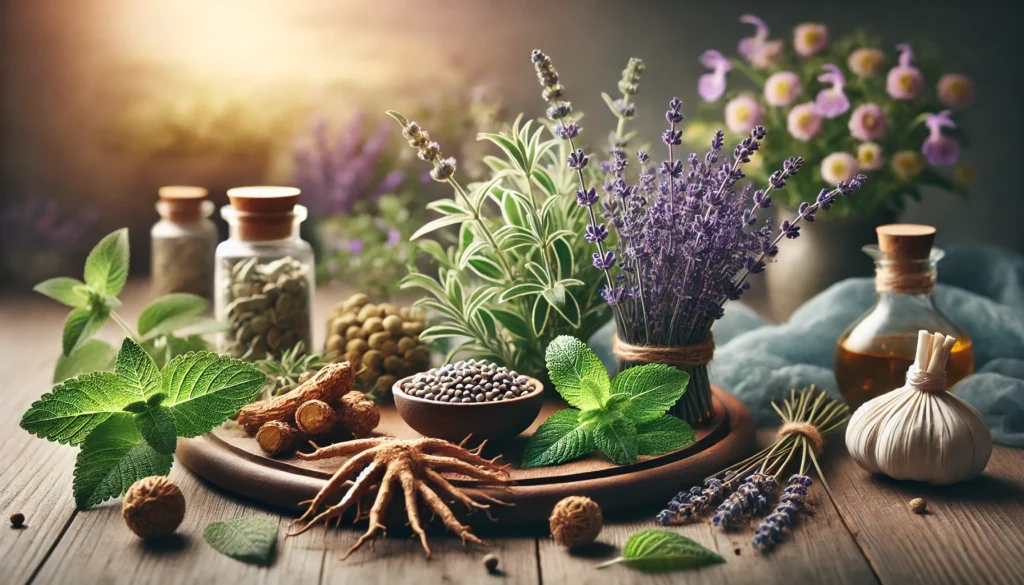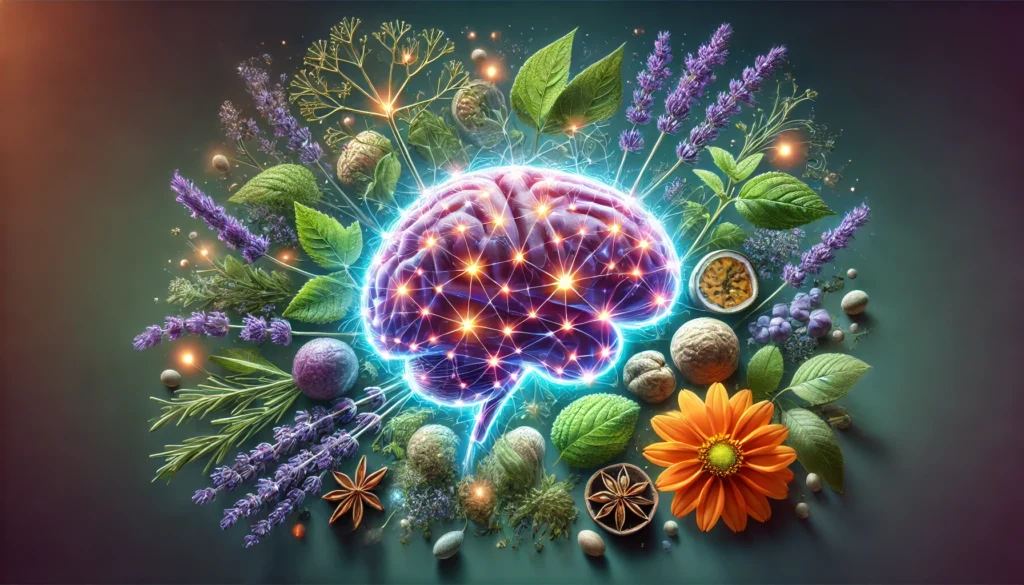Understanding the Connection Between Herbs and Mental Health
In an era where mental well-being is increasingly recognized as a cornerstone of overall health, the exploration of natural remedies has gained significant traction. Among these remedies, herbs have long been celebrated for their ability to support emotional balance and cognitive resilience. Recent scientific advancements have brought renewed attention to the best herbs for mental health, highlighting their potential to act as natural mood boosters and anxiety-reducing allies. Far from being mere folklore, the use of herbs to reduce stress and promote mental clarity is now grounded in an expanding body of clinical research.
You may also like: Where to Buy Bacopa Monnieri: How to Find Quality Supplements for Cognitive and Memory Support
Our understanding of what herbs help with anxiety and stress-related conditions has evolved from anecdotal evidence to include sophisticated studies on pharmacologically active compounds. These discoveries have reinforced the idea that certain plants possess bioactive molecules capable of influencing neurotransmitter systems, hormonal pathways, and inflammatory responses in ways that meaningfully impact mental health. As the search for effective, holistic options grows, herbs good for stress management and emotional well-being are becoming essential components of integrative mental health strategies.
Why Turn to Herbs for Mental Wellness Support?
Conventional pharmacological treatments for anxiety, depression, and mood disorders, while often effective, can come with undesirable side effects, dependency risks, and long-term health implications. In contrast, many individuals are seeking gentler, more natural interventions to complement or replace traditional therapies. This trend underscores the rising popularity of mood boosting herbs, especially among those aiming to nurture mental health proactively rather than reactively.
Herbs offer a multi-dimensional approach to mental wellness, working not just at the level of neurotransmitters but also addressing the body’s stress response systems, sleep quality, cognitive function, and overall resilience. For those seeking a deeper, more sustainable way to cultivate emotional health, learning about the best herbs for mental health represents an empowering first step.

How Herbs Influence Brain Chemistry and Emotional Balance
The efficacy of herbs to reduce stress and stabilize mood is deeply intertwined with their ability to modulate critical biochemical pathways in the brain. Some herbs act by influencing the gamma-aminobutyric acid (GABA) system, which plays a major role in calming nervous activity. Others enhance serotonin and dopamine production, key neurotransmitters responsible for feelings of happiness, motivation, and satisfaction.
Moreover, several anxiety reducing herbs have been shown to mitigate the body’s stress hormone cascade, especially by modulating cortisol levels. High cortisol, often a consequence of chronic stress, has been linked to anxiety, depression, cognitive impairment, and immune dysfunction. By regulating this hormonal axis, herbs can provide not only symptomatic relief but also address some of the underlying biological drivers of mental health challenges.
Top Science-Backed Herbs for Mental Health and Emotional Wellness
Ashwagandha: The Adaptogen of Tranquility
Ashwagandha (Withania somnifera) is often hailed as one of the most powerful herbs good for stress relief. Traditionally used in Ayurvedic medicine, it is classified as an adaptogen, a category of herbs that help the body resist physical, chemical, and biological stressors. Modern research has shown that Ashwagandha supplementation can significantly lower cortisol levels, improve sleep, and reduce symptoms of anxiety.
Clinical trials have demonstrated that Ashwagandha root extract can substantially decrease stress scores in individuals with chronic stress, while also enhancing overall well-being. This dual action of mitigating stress and uplifting mood positions Ashwagandha as one of the best herbs for mental health support. Its calming effect on the nervous system makes it particularly valuable for individuals experiencing stress-related cognitive fatigue and emotional burnout.

Rhodiola Rosea: Enhancing Resilience and Cognitive Function
Another revered adaptogen, Rhodiola rosea, has earned its place among mood boosting herbs for its unique ability to promote emotional resilience. Native to cold, mountainous regions of Europe and Asia, Rhodiola has been traditionally used to combat fatigue and enhance stamina.
Scientific studies indicate that Rhodiola can improve symptoms of stress-induced burnout, depression, and anxiety by regulating the hypothalamic-pituitary-adrenal (HPA) axis. Additionally, it has been shown to enhance mental performance under stress, making it a particularly attractive option for individuals seeking to maintain focus and emotional balance during challenging periods. Its synergistic impact on both physical endurance and psychological health distinguishes it among herbs to reduce stress.
Lavender: A Fragrant Ally Against Anxiety
Lavender (Lavandula angustifolia) is celebrated not only for its soothing fragrance but also for its well-documented anxiolytic properties. As one of the most extensively studied anxiety reducing herbs, lavender has been shown to exert calming effects on the central nervous system without causing sedation or dependency.
Oral lavender oil preparations have demonstrated comparable efficacy to some conventional anxiolytics in clinical trials, offering a natural alternative with fewer side effects. Inhalation and topical application methods have also shown promising results in reducing acute anxiety and improving sleep quality. For individuals seeking a gentle yet effective herb to alleviate nervous tension, lavender offers a compelling, science-backed solution.

Passionflower: Nature’s Sedative for Restful Calm
Passionflower (Passiflora incarnata) has been traditionally used for centuries as a calming herb. Modern research supports its use as an effective agent for reducing symptoms of anxiety and promoting restful sleep. Studies suggest that passionflower enhances GABA activity in the brain, helping to lower excessive neural excitability that underlies anxious states.
In clinical comparisons, passionflower preparations have shown similar effectiveness to prescription anxiolytics such as oxazepam, but without the sedative hangover effect often associated with pharmaceutical treatments. This makes passionflower a highly attractive option for individuals who prefer natural remedies for easing emotional tension and supporting restorative sleep, thereby reinforcing its standing among herbs good for stress management.
Lemon Balm: Brightening Mood and Reducing Nervousness
Lemon balm (Melissa officinalis) is a member of the mint family celebrated for its gentle yet potent mood-boosting effects. Clinical research has demonstrated that lemon balm extracts can reduce symptoms of anxiety, promote calmness, and even enhance cognitive function under stress.
One notable study found that individuals who consumed lemon balm reported improvements in mood and cognitive performance during stressful tasks, suggesting its potential as one of the most effective mood boosting herbs. Its versatility—available as teas, tinctures, capsules, and essential oils—makes lemon balm an accessible and appealing option for those seeking natural ways to foster emotional balance.

Ginseng: Energizing Mind and Mood
Ginseng, particularly Panax ginseng and American ginseng (Panax quinquefolius), is often praised for its ability to enhance physical endurance and cognitive clarity. However, ginseng’s benefits extend beyond energy to include significant mood-stabilizing and stress-reducing effects.
Research has found that ginseng can modulate the HPA axis, reduce inflammatory markers associated with depression, and increase levels of key neurotransmitters involved in mood regulation. Its adaptogenic properties help buffer the psychological and physiological impacts of chronic stress, making it one of the most multifaceted herbs to reduce stress while boosting mental vitality.
Saffron: A Golden Elixir for Emotional Wellness
Saffron (Crocus sativus) is best known as a culinary spice, but it is also gaining recognition for its profound effects on mental health. Clinical trials have revealed that saffron extracts can be as effective as conventional antidepressant medications in alleviating symptoms of mild to moderate depression.
The active compounds in saffron, such as crocin and safranal, are believed to influence serotonin metabolism, a key pathway in mood regulation. Moreover, saffron has shown promise as one of the mood boosting herbs with minimal side effects, offering a vibrant, natural option for individuals seeking gentle support for emotional well-being.
Scientific Considerations and Safety of Herbal Mental Health Support
While the best herbs for mental health present promising opportunities for holistic care, it is crucial to approach their use with informed caution. Not all herbs are appropriate for every individual, and factors such as dosage, potential interactions with medications, and underlying health conditions must be carefully considered.
Clinical studies typically use standardized extracts with specific concentrations of active compounds, which may differ significantly from over-the-counter herbal products. Therefore, consulting with a healthcare provider knowledgeable in botanical medicine can help ensure that the selected herbs are appropriate, safe, and effectively integrated into a broader mental health plan. Furthermore, ongoing research is vital for continually refining our understanding of the nuanced effects of these powerful natural allies.
Incorporating Herbs Into a Comprehensive Mental Health Strategy
Herbs should not be seen as standalone cures but rather as valuable components of an integrative mental health strategy. Mindfulness practices, regular physical activity, a nutrient-dense diet, quality sleep, and strong social connections all contribute to a resilient emotional foundation. When combined with these lifestyle factors, herbs good for stress and emotional wellness can significantly enhance one’s ability to navigate life’s challenges with greater grace and stability.
Practical integration can include incorporating herbal teas into daily routines, using standardized supplements under professional guidance, or experimenting with aromatherapy practices involving essential oils from anxiety reducing herbs like lavender and lemon balm. The key lies in creating personalized, sustainable rituals that nurture both mind and body.

Frequently Asked Questions: Best Herbs for Mental Health
What makes herbs different from pharmaceutical treatments for mental health issues?
Herbs often provide a more holistic approach to emotional well-being by targeting multiple physiological pathways simultaneously. Unlike pharmaceuticals that may focus solely on one neurotransmitter system, many of the best herbs for mental health influence hormonal regulation, inflammatory processes, and neurotransmitter balance all at once. For example, while a drug might target serotonin exclusively, herbs good for stress often modulate serotonin, dopamine, and cortisol levels together. This broader mechanism may offer a gentler, more sustainable approach for some individuals, although it is not a replacement for clinical care in severe cases. Additionally, those exploring herbs to reduce stress may appreciate their generally lower risk profiles when properly used under professional supervision.
Can combining multiple herbs enhance their effectiveness for mental health support?
Emerging research suggests that thoughtfully combining anxiety reducing herbs may offer synergistic effects that amplify benefits. For instance, blending ashwagandha with lemon balm could simultaneously soothe the nervous system and elevate mood through complementary mechanisms. However, herbal synergy requires careful understanding; combining too many herbs indiscriminately may overwhelm the body or introduce unexpected interactions. Those seeking the best herbs for mental health should consider professional guidance when layering multiple botanicals. Personalized herbal combinations might better address complex emotional needs compared to using single herbs in isolation.
Are there particular life stages when herbs are more beneficial for mental health?
Certain periods, such as adolescence, postpartum recovery, menopause, and midlife transitions, may particularly benefit from strategic use of mood boosting herbs. For example, during menopause, herbs good for stress like Rhodiola and lavender may help buffer hormonal shifts that impact mood and anxiety. Likewise, for young adults coping with the pressures of academic or early career life, herbs to reduce stress may support resilience without the side effects sometimes seen with pharmaceuticals. The key lies in matching the right herb to the specific physiological changes and emotional needs of the life stage. Professional herbalists can tailor approaches for these transitions, enhancing outcomes naturally and thoughtfully.
What should consumers look for when choosing high-quality herbal supplements for mental health?
Not all herbal products are created equal, and potency can vary dramatically. To gain the maximum benefit from the best herbs for mental health, it’s crucial to seek standardized extracts, which guarantee consistent concentrations of active compounds. Look for certifications such as USP Verified or NSF Certified to ensure purity and potency. Herbs good for stress should be free from contaminants like heavy metals, pesticides, and fillers. Additionally, understanding whether the product uses the most effective part of the plant\u2014for instance, the root of ashwagandha or the flower of passionflower\u2014can make a significant difference in effectiveness.
How long does it usually take to notice the effects of herbs on mood and anxiety?
Unlike many conventional medications that act rapidly, herbs to reduce stress often require consistent use over several weeks to manifest their full benefits. Some individuals may notice subtle improvements in sleep or mood within a few days, especially with fast-acting anxiety reducing herbs like lavender. However, adaptogens such as ashwagandha or Rhodiola typically require four to eight weeks of daily use for optimal results. Patience and consistency are key when using mood boosting herbs, as they support the body\u2019s intrinsic healing processes rather than masking symptoms instantly. Setting realistic expectations fosters better outcomes and a more sustainable relationship with herbal support.
Can diet and lifestyle influence how well herbs work for mental health?
Absolutely\u2014the effectiveness of herbs good for stress is significantly enhanced by a supportive lifestyle foundation. A nutrient-dense diet rich in omega-3 fatty acids, antioxidants, and minerals like magnesium provides the raw materials necessary for optimal neurotransmitter function. Regular exercise, mindfulness practices, and adequate sleep all create a biological environment in which the best herbs for mental health can perform optimally. Conversely, a diet high in processed foods, chronic sleep deprivation, or unmanaged stress can blunt the positive effects of even the most potent herbs. Integrating herbal strategies within a holistic lifestyle amplifies results naturally and sustainably.
Are there lesser-known herbs that show promise for supporting mental health?
Yes, in addition to more familiar options, several lesser-known botanicals are gaining attention in scientific circles. For instance, Bacopa monnieri, traditionally used in Ayurvedic medicine, has shown potential not only as one of the anxiety reducing herbs but also for enhancing memory and cognitive function. Holy Basil (Ocimum sanctum), sometimes called “Tulsi,” is emerging as a potent adaptogen that addresses both mood and physiological markers of stress. Exploring these lesser-known options allows individuals to personalize their approach beyond the typical roster of herbs to reduce stress. Ongoing research continues to uncover exciting possibilities in the herbal world for mental wellness.
Can herbs be safely integrated with conventional therapies for mental health conditions?
In many cases, yes\u2014but it must be done thoughtfully. Some herbs good for stress, such as lavender or lemon balm, have relatively low risks of interaction and can be used alongside psychotherapy or medication with physician oversight. However, herbs like St. John’s Wort, though popular among mood boosting herbs, are notorious for interacting with a wide range of medications, including antidepressants and birth control pills. Those exploring what herbs help with anxiety while undergoing conventional treatment should always consult with a healthcare provider trained in integrative medicine. Safe, informed integration can maximize benefits while minimizing risks.
What future trends are emerging in the field of herbal mental health support?
Future innovations are focusing on personalized herbal protocols based on genetic and microbiome profiles. Researchers are investigating how individual variations in gut flora influence responses to herbs good for stress and mood modulation. There is also growing interest in developing precision formulations that combine specific phytochemicals from multiple plants for targeted neurological pathways. As clinical trials advance, the future may bring even more refined approaches to using the best herbs for mental health. These innovations promise not only more effective outcomes but also a deeper understanding of the complex, dynamic relationship between botanicals and emotional well-being.
What common mistakes should people avoid when using herbs for mental health?
One of the most frequent pitfalls is inconsistent use\u2014taking anxiety reducing herbs sporadically and expecting immediate, dramatic results. Another mistake is self-prescribing without understanding potential contraindications, which can lead to reduced effectiveness or unexpected interactions. Some individuals also neglect foundational health habits, assuming that herbs alone will solve deeply rooted emotional imbalances. For the best results with herbs to reduce stress and support emotional vitality, users should prioritize education, consistency, and professional guidance. Respecting the nuances of herbal medicine elevates its potential as a profound ally in the pursuit of mental health.

Conclusion: Embracing the Power of Herbs for a Balanced Mind
The growing body of research supporting the use of herbs to reduce stress, enhance mood, and promote emotional resilience marks an exciting frontier in mental health care. By understanding what herbs help with anxiety and recognizing their scientifically validated benefits, individuals can make empowered, informed decisions about their mental wellness journeys.
The best herbs for mental health offer a powerful testament to the wisdom of nature, providing pathways to greater peace, clarity, and vitality. As we continue to seek holistic, sustainable approaches to mental well-being, integrating mood boosting herbs and anxiety reducing herbs into daily life can serve as a profound act of self-care rooted in tradition, supported by science, and guided by personal empowerment.
Ultimately, embracing these natural tools reminds us that true mental health is not merely the absence of illness, but the cultivation of a vibrant, resilient spirit capable of thriving even amidst life’s inevitable challenges.
Further Reading:
Common herbs for stress: The science and strategy of a botanical medicine approach to self-care
10 Natural Remedies and Supplements Proven by Science to Help Treat Anxiety
Medicinal Plants Used for Anxiety, Depression, or Stress Treatment: An Update
Was this article helpful? Don’t let it stop with you. Share it right now with someone who needs to see it—whether it’s a friend, a colleague, or your whole network. And if staying ahead on this topic matters to you, subscribe to this publication for the most up-to-date information. You’ll get the latest insights delivered straight to you—no searching, no missing out.
.Important Note: The information contained in this article is for general informational purposes only, and should not be construed as health or medical advice, nor is it intended to diagnose, prevent, treat, or cure any disease or health condition. Before embarking on any diet, fitness regimen, or program of nutritional supplementation, it is advisable to consult your healthcare professional in order to determine its safety and probable efficacy in terms of your individual state of health.
Regarding Nutritional Supplements Or Other Non-Prescription Health Products: If any nutritional supplements or other non-prescription health products are mentioned in the foregoing article, any claims or statements made about them have not been evaluated by the U.S. Food and Drug Administration, and such nutritional supplements or other health products are not intended to diagnose, treat, cure, or prevent any disease.


